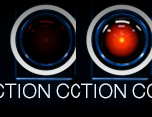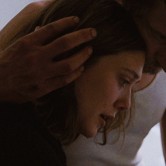Movie Review: AMERICAN TEEN (2008)
![]()
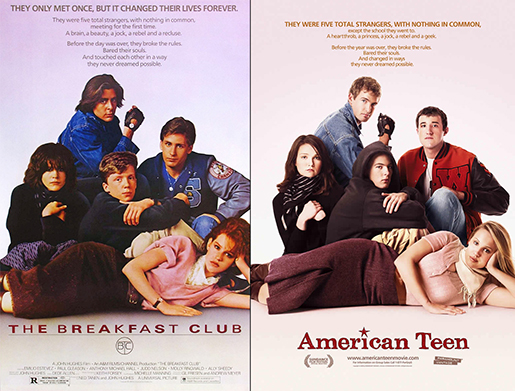
The Kids Stay In The Picture
The new Nanette Burstein documentary American Teen observes and even tampers with a senior class’ transcendence through a high school (“Total caste system”) in Warsaw, Indiana, a small American town that’s labeled “Red State all the way”. To set the stage, the filmmakers all but steal the compact and diverse grouping of stereotypes from the influential John Hughes cult film The Breakfast Club (1985). We are introduced to five main players attending Warsaw Community High School: Colin Clemens (The Jock), Megan Krizmanich (The Princess), Jake Tusing (The Geek), Mitch Reinholt (The Heartthrob in place of The Criminal), and Hannah Bailey (The Recluse — that’s the trailer’s version — The Rebel). Any moment in American Teen would have been appropriate to play ‘Don’t You (Forget About Me)’ by Simple Minds.
This film is really about the fear that stems in adolescence and stirs into oncoming adulthood. The fear of being defined by your vices and insecurities brought up by those vicious, maddening years of being a teenager. The fear of realizing your idealistic youth spent in middling, regretful pastimes that are glibly called ‘the best years of your life’. It is dominated by the fear that things will not get better while the present is eaten up by internal bitterness. High school can really suck. Thankfully the clouds clear and the sun comes out on graduation day.
Colin, a self-described jock, is a nice enough guy. He plays High School Basketball, which in this town is a populist blood sport. Adults actually wear all-body painted team colors in the gym stands. Its citizens are about as obsessed as the Massillon, Ohio populace was with high school football in the Ken Carlson documentary Go Tigers! (2001) where it is customary to hold back boys to repeat the eighth grade because they’ll be older and bigger as football players in senior year.
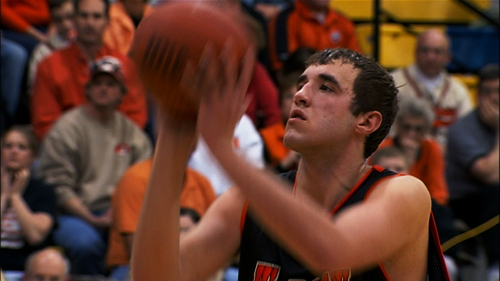 The stakes are considerably higher for poor Colin. If he does not get a scholarship to play basketball for a college, he will have to join the army and go to Iraq. His dad says “get the rebounds or it’s the army with a smile”. That’s like when the Romans threw Christians to the tigers! However engaging this subplot is, it pales in comparison with Steve James’ masterful Hoop Dreams (1993), the pedestal of documentary filmmaking that showed us the hardships and brimming humanity of two inner-city Chicago teens playing high school basketball and dreaming of making the NBA. There were scenarios in that three-hour movie that were laced with deep ironies and great joys.
The stakes are considerably higher for poor Colin. If he does not get a scholarship to play basketball for a college, he will have to join the army and go to Iraq. His dad says “get the rebounds or it’s the army with a smile”. That’s like when the Romans threw Christians to the tigers! However engaging this subplot is, it pales in comparison with Steve James’ masterful Hoop Dreams (1993), the pedestal of documentary filmmaking that showed us the hardships and brimming humanity of two inner-city Chicago teens playing high school basketball and dreaming of making the NBA. There were scenarios in that three-hour movie that were laced with deep ironies and great joys.
Samantha stands in as the princess who many speculate in awe over her dulled beauty. Her personality is as lazy as Paris Hilton’s facial features. Samantha, for the most part, teeters between indifference and vindictiveness. A scene of her using a firearm in target practice is an appropriate metaphor for her lethality. Early in the school term, she displays a sociopathic mean streak. First she is instrumental in sending an image of a female classmate topless to every other student and then leaves cruel remarks in the victim’s voice-mail. After laughing hysterically, Samantha comes to her senses long enough to suggest “…leav(ing) her a message not to kill herself”. She has the makings of a Sgt. Charles Graner.
Samantha’s repugnant acts escalate until she gets caught, which is her only regret: “It’s horrible to be backstabbed at the last minute”. Very late in the film, a tragic event revealed around Samantha’s troubled family history isn’t enough to garner her sympathy. Finally, Samantha pines for a future where she will be surrounded by healthy, like-minded people. She simply exhausts my versatile ability to empathize. I make it a point to keep away from people like her.
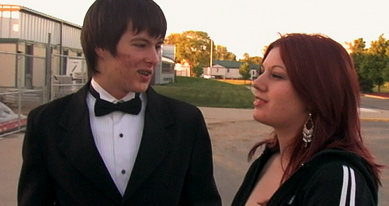 Justin chastises himself harshly for his band participation, his awkwardness, his monotone, his acne-riddled cheeks, and the fact that he plays Warcraft. With the upcoming student dance approaching, he bemoans, “I wish I had a girl to dance with”. He has a pixelated dream sequence where he is virtual warrior who battles monsters and saves the damsel-hobbit in distress. The short remains faithful to that most irritating cliché where the pretty girl’s smile reveals, of all horrors, braces.
Justin chastises himself harshly for his band participation, his awkwardness, his monotone, his acne-riddled cheeks, and the fact that he plays Warcraft. With the upcoming student dance approaching, he bemoans, “I wish I had a girl to dance with”. He has a pixelated dream sequence where he is virtual warrior who battles monsters and saves the damsel-hobbit in distress. The short remains faithful to that most irritating cliché where the pretty girl’s smile reveals, of all horrors, braces.
Rising above his insecurity, Justin occasionally gets girlfriends who don’t stay for very long and for good reason. Perhaps being the subject of a documentary is a likely attraction considering the YouTube-posting, fifteen-seconds-of-fame mentality. When Justin is dumped in a food court, his ex’s eyes never rise away from her Blackberry. Justin becomes downright pitiful as he lays his cheek against the table and remarks how much grease he has left. Much of Justin’s antics and eventual spiral into excess drinking and kissing strangers in Mexico is off-putting. Justin gives geeks a bad name.
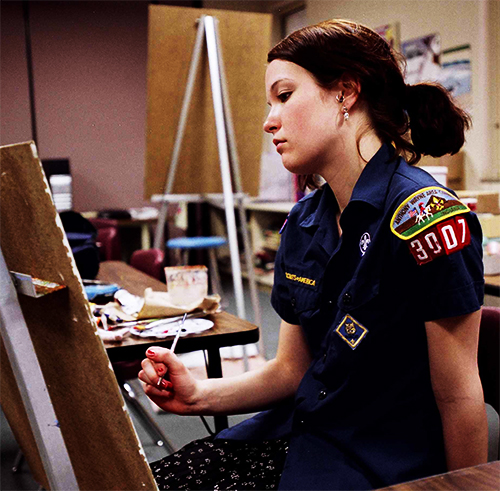 Hanna, the brightest star here, is a rebellious and funky artist who aspires to become a filmmaker: “I want people to remember me. Not work nine to five and die”. It’s a no-brainer. She inspires guys who developed crushes for Juno – that snarky, pregnant goddess immortalized by Ellen Page. Despite her eccentric and lively demeanor, she has taken some very hard blows. After being emotionally pulverized by her then-boyfriend in a very vulnerable position, she is so devastated that she cannot go back to school with him there. Her lengthy absence is called on by the uncaring school administration threatening to deny her graduation if she avoids another day at school.
Hanna, the brightest star here, is a rebellious and funky artist who aspires to become a filmmaker: “I want people to remember me. Not work nine to five and die”. It’s a no-brainer. She inspires guys who developed crushes for Juno – that snarky, pregnant goddess immortalized by Ellen Page. Despite her eccentric and lively demeanor, she has taken some very hard blows. After being emotionally pulverized by her then-boyfriend in a very vulnerable position, she is so devastated that she cannot go back to school with him there. Her lengthy absence is called on by the uncaring school administration threatening to deny her graduation if she avoids another day at school.
Exasperated with living in this suffocating town, she talks to her parents about moving to California and is told coldly told by her conservative mother that “(she) is not special”. Hanna is the most likable and most sympathetic and deserving of a better future. She has a stand-off near the end of the film that inspired cheers from the audience and yours truly. Hanna redeems and glorifies the geek title.
Mitch is a guy who plays basketball, likes to socialize, yet isn’t a very interesting person. Midway he has an epiphany about his feelings for Hanna, a girl outside his social circle. She is struck by the surface. After her previous break-up, Hanna embraces her good fortune that a popular hunk would even consider her. While “Love Is In The Air” is sung by John Paul Young on the soundtrack, the two even hold hands while driving in her car. In my notes, I referred to Mitch as a “lucky bastard” and the next page reads “worthless anus-scum” for what he does later. Forget being a heartthrob — Mitch is a criminal.
While watching American Teen, you might find yourself tempted to hum Mountain Town by Trey Parker and Matt Stone. There are some keen details depicting the routine of a middle American high school. There are updates from lame student news videos that are broadcast on thirteen-inch televisions in each classroom. The National Anthem is uniformly pledged every morning. From a Canadian point of view, this seems rather excessive. The parking lot in front of the school building looks more like a shopping mall. Would it be rude to observe that the all-white basketball team has a token black guy? The most chilling observation is a marine and army memorial shrine dedicated to past students who were killed fighting in Iraq.
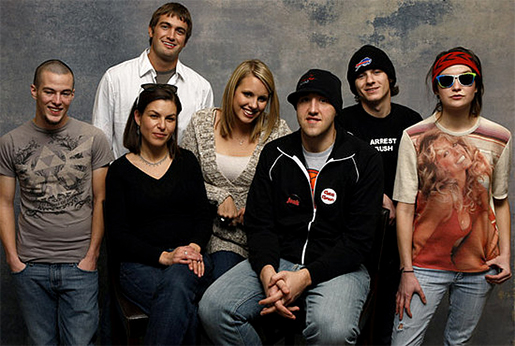
Director Nanette Burstein has made a moderately entertaining documentary that doesn’t measure up to her previous works On The Ropes (1999), a powerful account about a group of boxers that follows one innocent, Tyrene Manson, into an unjust criminal trial, and The Kid Stays in the Picture (2002), a fascinating memoir depicting the rise and fall and semi-rise of Hollywood producer Robert Evans (The Godfather, Chinatown). The visual flair that drive these stories is well exercised by Burstein; however, The Jeff Danna score for The Kid Stays in the Picture is infinitely more memorable and effective than anything music editors Chris Douridas and Jim Schultz have contributed to American Teen.
Frankly, the material in American Teen isn’t as consistently compelling, but despite a few lags, is rarely dull. Much of it looks as if it were shot like a fictional film with conversation set pieces and double-takes that seem too good to be true. There is a contrivance mostly throughout that feels staged rather than spontaneously captured. I doubt that montage depicting each of everyone’s reaction to a scandalizing image by computer and cell-phone was not rehearsed. Though there are moments I am tempted to forgive, such as Colin’s father sending off his son in a get-up I would never reveal here. Each of the main characters has an animated sequence that visualizes their deepest thoughts. My personal favorite was a piece of stop-motion depicting “Hanna’s Depression” that is like a cross between Caroline and Clive Barker.
American Teen is worth seeing at least once; however, it is not in the same league as this year’s most prestige documentaries Standard Operating Procedure and Man On Wire. Watching these teenagers graduate, I wonder if Burstein would revisit them in ten years in time for the reunion. The update could be in the same vein as Michael Apted’s Up documentary series. American Teen may not be Oscar worthy, but it obliterates any fond nostalgia from your own high school experience. Outside the theatre on my way out, there were ushers giving out buttons depicting whose team of the five one would like to belong to. Given a choice, I’d have jumped on the Hanna bandwagon in a second. I hope to see a film of hers one day.
“American Teen” Trailer
“The Breakfast Club” Trailer
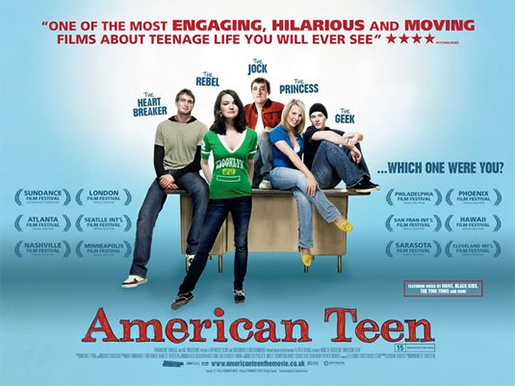
© 2008 – 2024, CINELATION | Movie Reviews by Chris Beaubien. All rights reserved.


